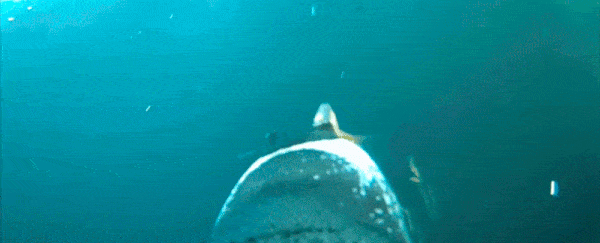Sardines scatter wildly as a smooth penguin head zooms through their tight swirling mass within blue-green waters of the Wildlife Conservation Society's footage. One of those silver sardines becomes the penguin's dinner on the second swoop through.
Taken in the Beagle Channel off Isla Martillo, Argentina, the penguin bodycam footage helped clarify the bird's feeding ecology.
"We wrote in many papers that the seabird community in the Beagle Channel rely on sardines," said marine ecologist Andrea Raya Rey. "But this is the actual proof, and now it is confirmed and with a star behind the camera: the penguin."
WOW! Penguin takes astounding selfie video while it dives and feeds #penguinawarnessday @wcsargentina @CadicUshuaia https://t.co/nIqgs2UXBE pic.twitter.com/lp2aGFGXOk
— WCS Newsroom (@WCSNewsroom) January 18, 2022
Up to 90 cm (35 inches) in height, gentoos (Pygoscelis papua) are the world's third-largest penguins. These lovable waddlers call sub-Antarctic islands their home. They build pebble nests on these rocky shores and are notorious for stealing pebbles from other penguins' nests.
Gentoo penguins can swim an impressive 35 km (22 miles) per hour – faster than any other diving bird – and can dive up to 90 m (300 feet) deep. Using this powerful diving ability, they're thought to scour near the seabed for food such as crustaceans and squid. But the video shows they will not miss an opportunity for some fish closer to the surface.
Cómo me estoy yendo de campaña dejo por acá unas fotitos para el #PenguinAwarenessDay 20/01 día para pensar en las problemáticas que enfrentan. son de las especies que más contribuyen a la economía del turismo y muy poco (casi nada) vuelve para estudiarlos/conservación pic.twitter.com/cO1PfevBUf
— Andrea Raya Rey (@andrearayarey2) January 19, 2022
Raya Rey is studying the gentoo colonies in Argentina to better understand how changes in their environment affect them. Unlike many other species, it appears climate change is actually increasing this penguin's range – southwards as ice fields recede.
However, this doesn't mean they're immune to other associated threats, like expected increases in krill fishing as we adapt to new ways to feed human populations or toxic algal blooms and diseases invading waters that were once too cold for such threats to thrive.
And if they do rely more on small pelagic fish like sardines than previously thought, they may be impacted even sooner like other penguin species already have.
 The gentoo penguin with the "PenguinCam". (Sabrina Harris)
The gentoo penguin with the "PenguinCam". (Sabrina Harris)
Meanwhile, though, the feathered amateur filmmaker seemed unperturbed by its scientific assignment.
"We attached the device just for one foraging trip," said Raya Rey. "Upon the penguin's return, we unattached the device and monitored the breeding success of the nest. The Gentoo continued with its parental duties and taking care of the offspring."
